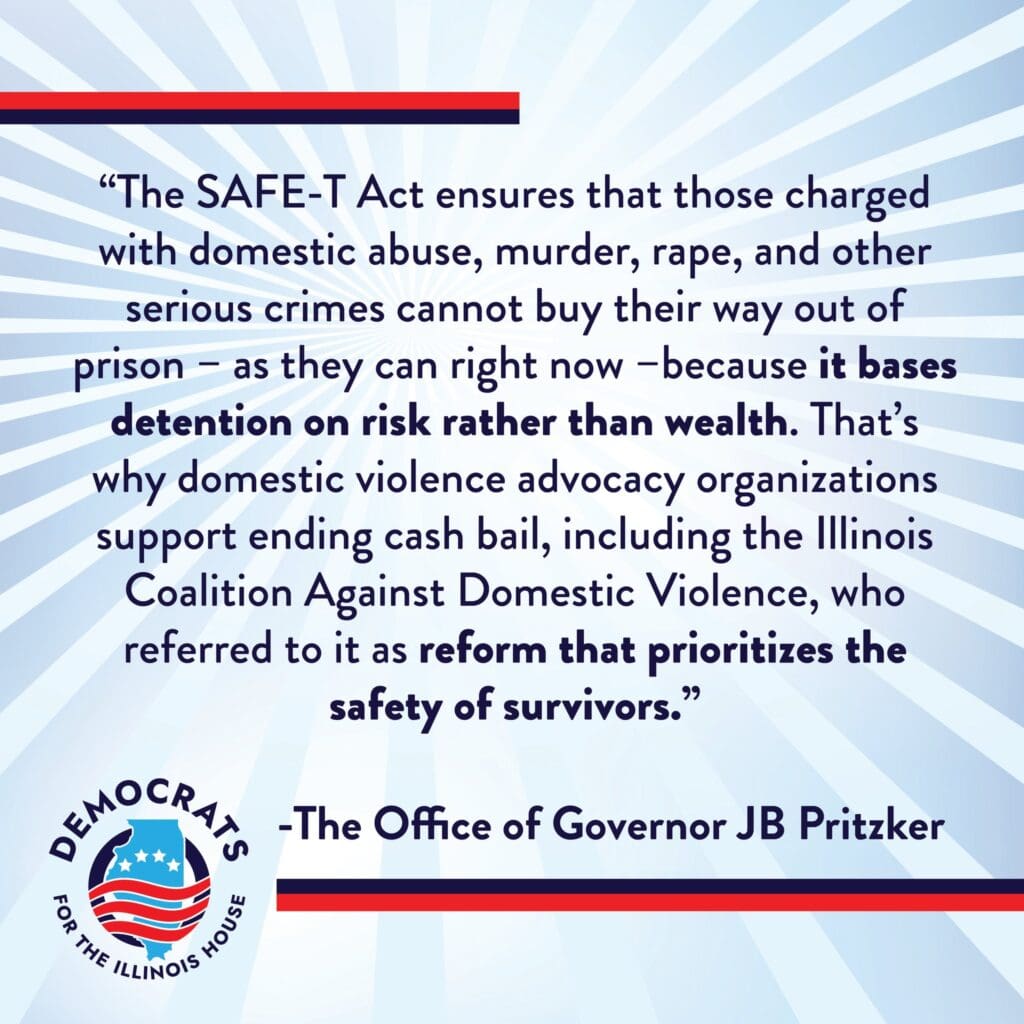
Governor JB Pritzker Released the Following Letter In Response to Madison County State’s Attorney False Statements on SAFE-T Act
States Attorney Haine,
I was disappointed to read your letter and watch your television interview defending a criminal justice status quo where accused murderers, domestic batterers, rapists, and other dangerous criminals can buy their way out of jail pending trial if they have enough money.
Unfortunately, you made clear in the KDSK interview that your real concern is not about the serious offenses you falsely claim are non-detainable, but to ensure that low level defendants face punishment before they are found guilty. Your approach – seeking to deter possible future crimes by punishing individuals accused of less serious offenses before they have the opportunity to defend themselves in court – is contrary to the foundation of our justice system and based on outdated research that has been debunked.
You also scoff at the notion that the cash bail system contributes to a criminal justice system that disproportionately punishes Black and Brown citizens, saying to KDSK that “there is no truth to the idea that cash bail has a racially disparate impact.” Contrary to your claim, the bipartisan, independent US Commission on Civil Rights, established by Republican President Dwight D. Eisenhower, recently published a report casting light on “stark racial and gender disparities [in the administration of cash bail],” and noting higher pre-trial detention rates and financial conditions of release imposed on Black and Latinx individuals.
In your response to KDSK reporter Mark Maxwell, you admitted that you have seen instances where a defendant accused of a serious crime “[got out of jail], going on to intimidate a witness, going on to harm someone, going on to commit a repeat offense, while they’re out on bail that they paid.” Conversely, the aforementioned report by the bipartisan US Commission on Civil Rights found that 60% of defendants were in jail pre-trial simply because they couldn’t afford bail. That is the broken system that you are defending through fearmongering and unvarnished mistruths.
The SAFE-T Act ensures that those charged with domestic abuse, murder, rape, and other serious crimes cannot buy their way out of prison – as they can right now – because it bases detention on risk rather than wealth. That’s why domestic violence advocacy organizations support ending cash bail, including the Illinois Coalition Against Domestic Violence, who referred to it as reform that prioritizes the safety of survivors.
Furthermore, I was disheartened by your conclusion that you are powerless to keep dangerous people in prison beginning January 1. Your conclusion is not based on the law. Moreover, if your comments are intended to signal that you will refuse to take available steps to seek detention for individuals who present a danger to the community, that would be a dereliction of duty.
Your letter claims that certain offenses become non-detainable under the SAFE-T Act. But your reading of the law has been debunked by multiple non-partisan fact checkers, including the Associated Press, Snopes, and Politifact. Nevertheless, in the interest of justice and safety, I will explain the fallacy in your reading of the law, including your false assertion to Mark Maxwell that prosecutors will have to meet an “unbelievably high standard” to show that a defendant presents a risk of fleeing and must be detained.
You falsely claim that the SAFE-T act creates broad categories of non-detainable offenses, including forceable felonies. That’s simply not true. The most serious forcible felonies, such as first-degree murder, sex offenses, stalking, and gun crimes, such as aggravated discharge of a firearm and unlawful purchase of a firearm, are explicitly detainable where there is a clear risk to public safety.(1) Other probationable felonies that you and others have identified – such as second degree murder and aggravated DUI(2) – allow state’s attorneys several options for detention. Prosecutors may present evidence that the defendant poses a threat to public safety if the forceable felony involved a family member or domestic violence,(3) or that the defendant used a gun.(4) Furthermore, there is nothing in the SAFE-T Act that prevents prosecutors from using their discretion to charge repeat offenders with higher level felonies when the facts indicate it is appropriate. Under this system, risk, not wealth, determines whether these defendants will be detained prior to their trial.
Furthermore, the SAFE-T Act also allows courts to detain those accused of the probationable forcible felonies you reference in your press appearances if the defendants show a high likelihood of fleeing to avoid prosecution. You have argued that this is an “unbelievably high standard” and assert you, and other prosecutors, will be prevented from arguing that a defendant is likely to evade prosecution because of the seriousness of the charge. But nothing in the SAFE-T act prevents a prosecutor from making that argument for flight risk.(5) In January, neither you, nor prosecutors around Illinois, will be limited by this narrow interpretation that you’ve made today in service of political posturing.
To establish this likelihood of flight, prosecutors will have the opportunity to present arguments supported by the evidence which include but are not limited to the facts of each criminal offense committed, witness statements, the defendant’s criminal background, and prior instances of flight.(6) Prosecutors may also argue that the facts or potential sentence for certain criminal offenses make defendants a flight risk. The judge can weigh all this evidence in determining the likelihood that defendants will flee from prosecution. And again, that evidence—not whether the defendant is rich or poor—will determine whether the defendants are detained.
It is also notable that the SAFE-T Act allows a judge to set more restrictive conditions of pre-trial release, if the judge determines those conditions are necessary based on the specific facts of the case.(7) Such conditions can include electronic monitoring, no contract orders, curfews and other limitations intended to ensure appearance.(8) If those conditions are violated, the defendant can be detained. You have expressed your faith in judges to carefully consider relevant evidence and set appropriate bail. This faith should extend to the ability of judges to consider all appropriate evidence and arguments presented by prosecutors in your office to establish a basis to detain suspects when necessary or, alternatively, to set restrictive conditions of release.
I trust that your office will use all of the tools available under the law on January 1, and file motions to detain defendants you consider to be dangerous to the citizens of Madison County.
Sincerely,
Governor JB Pritzker
(1) 725 ILCS 5/110-6.1 (a)(1-6).
(2) 725 ILCS 5/110-6.1 (a)(7).
(3) 725 ILCS 5/110-6.1 (a)(3-4).
(4) 725 ILCS 5/110-6.1 (a)(6).
(5) See 725 ILCS 5/110-6.1 (a)(7); 725 ILCS 5/110-1 (e) (defining “willful flight” and neither provision limiting arguments related to the severity of the charge making flight more likely).
(6) 725 ILCS 5/110-6.1 (e)
(7) 725 ILCS 5/110-5; 725 ILCS 5/110-10.
(8) 725 ILCS 5/110-10.
